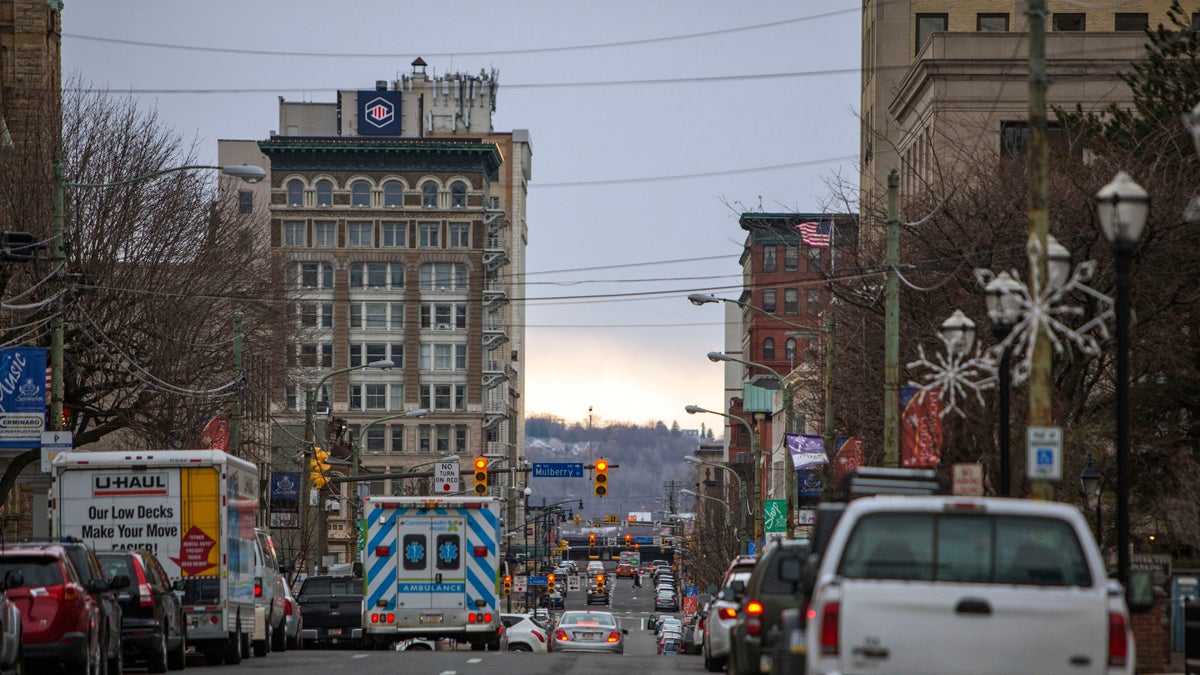In case you missed it: This week’s best reads from Pennsylvania cities

Join us for a community forum in Scranton, April 6. It’s free and open to the public. We'll see you there. (Photo by Jessica Kourkounis)
Do you live near Scranton? Come to our forum!
Pipes, paint, water, oh my!
Keystone Crossroads has been covering the legacy of lead in Pennsylvania cities for a few weeks now. We’ve covered paint, pipes, and testing both your children and your water. We’ve got stories upcoming on the history of lead poisoning and private versus public water systems. But rather than make you click all those individual links (tiring!), we’ve put all of our coverage on one, easy to enjoy page!
But we’re not the only ones looking into lead. York Daily Record found that funding for lead testing is all but absent in the city of York. Allegheny County has hired a lead inspector to investigate toxin levels. Next door, Cleveland is dealing with the outcome of 40+ years of lead poisoning.
Lead is on everyone’s minds these days, including Terry Gross. The host of Fresh Air spoke to David Rosner and Gerry Markowitz, the authors of Lead Wars, about how lead is “now really everywhere.”
Lights, (body) camera, action!
If you’re not talking about lead this week, maybe you’re talking about body cameras. Outfitting police officers with small cameras that record their interactions is supposed to help gather evidence and keep officers honest. Nationally, body cameras are a controversial topic, but in Pennsylvania, there’s are some specific challenges.
For one thing, finding funding for new technology is always a struggle. Pittsburgh, along with Allentown, Carlisle, Johnstown and the Central Bucks Regional Police Department, received federal Department of Justice funding to pay for the cameras. But Pittsburgh Police Chief Cameron McLay said the city likely wouldn’t have been able to afford the cameras otherwise.
The Pennsylvania State Police is estimating a $2 million price tag to outfit officers. Philadelphia mayor Jim Kenney has asked for $1 million in the budget to buy 800 more body cameras towards the goal of outfitting all officers by 2019.
But that spending may be a bit premature. The Pennsylvania District Attorneys Association has asked cities to wait before they start using cameras. The state wiretap law complicates body camera use, prohibiting recording in a private residence. While the legislature discusses possible modifications to the law, the DAs would like to create a set of best practices for the state.
Want to see where Pennsylvania stacks up to other states when it comes to body camera laws and usage? The Urban Institute has an interactive website to answer all your questions.
The bad news
Drug overdoses are on the rise again in Pennsylvania. When it’s all counted up, the number of overdoses in 2015 is expected to top 2014, when 2500 people died. Pennsylvania can only fund addiction treatment for one in eight residents who ask for help, which is higher than the national average.
On the flip side, police officers in Pennsylvania have saved 600 potential overdose victims in the last year using naloxone, an overdose antidote drug that blocks the effects of opioids. On Tuesday, the governor honored those officers, representing both local and state police, in Harrisburg.
A grand jury has found that the Diocese of Altoona-Johnstown concealed the sexual abuse of minors for decades. No one was charged because of the statute of limitations. The news has renewed calls to suspend the statute of limitations in cases of underage sexual abuse.
The budget stalemate continues on with more drama emerging each day. The state-related universities, like Penn State and Temple, are asking lawmakers to find a way to fund the $660 million gap left unfilled by the delay. The prison system has been given $200 million to stay open, without any spending legislation to authorize that payment. And finally, after weeks of uncertainty and a formal closing of the agency, the Pennsylvania Employee Retirement Commission is back up and running — at least for now.
The good news: it’s not just us!
Pennsylvania isn’t alone in facing challenges, though we do tend to handle them with a certain Keystone flair.
CityLab has a map of all the distressed communities in the country, down to the zip code. You can see how Pennsylvania stacks up against other states and regions. (And you can see how your town compares to your neighbors!)
Next City reports on how small-town America is starting to face big-city planning challenges. While their article focuses mostly on resort towns, the description could fit many of the small cities in Pennsylvania, from Clairton to Easton: “A lot of people are looking to both downsize and retain the ability to live a somewhat urban lifestyle, but not have to do it in an expensive or congested place like it is in a downtown of a large city.” Small cities, unite!
And finally, maybe it’s not really our fault at all: federal planning guidelines hamstring cities that try to plan effectively.
Come hang with us!
If you like Keystone Crossroads, I bet we’d like you! We’re having a community forum in Scranton on April 6th, and we’d love to see you there. We’ll be talking about the future of Scranton and the whole NEPA region. RSVP so we know how excited to get beforehand. (We’ll be very excited either way.)
WHYY is your source for fact-based, in-depth journalism and information. As a nonprofit organization, we rely on financial support from readers like you. Please give today.


